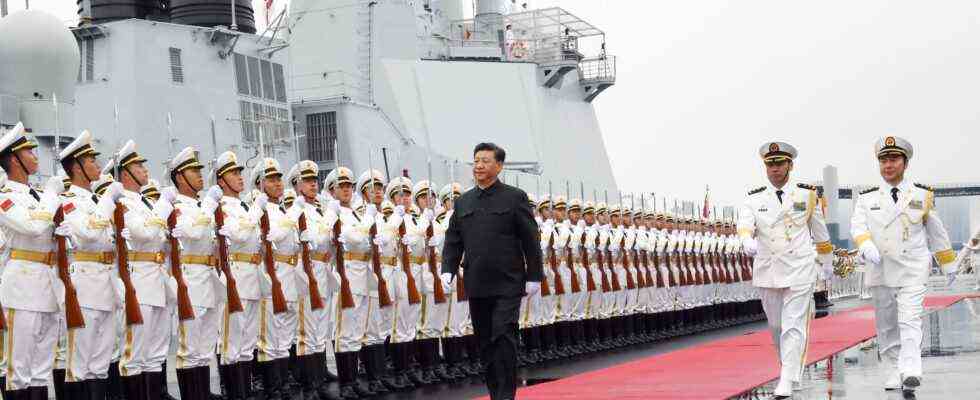analysis
Status: 09/24/2021 4:58 a.m.
Nowhere in the world are the USA and China so vying for influence as in the Indo-Pacific. Beijing is likely to respond to the latest US initiatives with counter pressure – although it also creates problems for itself.
At the UN General Assembly in New York this week, China’s head of state and party leader Xi Jinping once again spread emphatically peaceful messages: “The Chinese people always strive for peace, friendship and harmony,” Xi said in a video message. But things are far less harmonious in their own neighborhood: Chinese fighter planes invade Taiwan’s air defense zone almost every day. Even in the South China Sea, through which some of the most important trade routes in the world run, there are always dangerous confrontations.
China’s neighbors and the United States, the traditional power of order in the Indo-Pacific, are alarmed. “Beijing’s activities are undermining the rules-based order and threatening the sovereignty of other states,” warned US Vice President Kamala Harris during a recent visit to Singapore.
A Chinese patrol boat cruises near a Japanese flag boat off one of the Senkaku Islands.
Image: picture alliance / dpa / MAXPPP
Japan, China and Taiwan lay claim to the archipelago, which – depending on the country – they call Senkaku, Diaoyu or Diaoyutai.
Image: picture alliance / Hiroya Shimoji / epa / dpa
Outnumbered the US fleet
China calls its “active defense” strategy. Even far away from the mainland, on the high seas, the People’s Republic must “proactively” protect its interests. For example, the leadership in Beijing regards Taiwan as part of the People’s Republic; China claims most of the South China Sea for itself despite a different international arbitration award and ignores the territorial claims of other neighboring countries – including the Philippines and Vietnam.
But China also trumps because it can. The People’s Republic has modernized and significantly upgraded its military with a lot of money in recent years. China now has the largest navy in the world – with frigates, destroyers, nuclear submarines and two aircraft carriers of its own. According to US estimates, China’s fleet comprised around 360 ships at the end of 2020 – compared to almost 300 in the USA. The Chinese combat strength is expected to increase to around 400 ships by 2025.
“China has made the region more unstable”
Fleet strengths are one thing, military and technological capabilities are another. “The USA still has a clear advantage – for example with submarines and other underwater capabilities,” said Helena Legarda, defense expert at the Berlin think tank Merics. “But in the conventional navy, China has probably caught up with the US or has even overtaken them.”
One thing is clear: China wants to push back the influence of the USA in the Indo-Pacific. Beijing derives its claim to dominate the region itself from its size and long history. Xi Jinping has been speaking of “the great Chinese nation being regained strength” for years. In addition to the military, China is continuously expanding its economic influence in the region with free trade zones and infrastructure projects as part of the Silk Road Initiative. While the governments of neighboring countries mostly welcome economic cooperation, Beijing’s aggressive military demeanor scares them off and drives them into the arms of the old protective power of the USA.
“The strange thing is that China is constantly creating new problems for itself,” says Asia specialist Bill Hayton from the London research institute Chatham House. China could be in a much stronger position today if it did not annoy its Southeast Asian neighbors for ten years – for example through its confrontational behavior in the South China Sea. “But because of China’s missteps, the region has become significantly more unstable.”
China builds up counter pressure to AUKUS
China sees it differently. Beijing blames the USA for the fact that tensions have grown and sees itself under pressure from allegedly anti-Chinese alliances: that US President Biden has revived the four or “quad” security dialogue initiated in 2007 with Australia, Japan and India AUKUS forges new alliances with Australia and Great Britain, sees Beijing as a clear sign that Washington has one goal above all: to keep China small.
“The countries concerned should give up this outdated zero-sum game mentality and narrow-minded perspectives of the Cold War,” said Foreign Office spokesman Zhao Lijian after the submarine deal between Australia, Great Britain and the USA.
Defense expert Legarda warns that China will now increase its armament efforts even further because of the new AUKUS alliance. And the Chinese demonstrations of power in the region are also increasing.
Just two days after Xi Jinping’s message of peace to the world, China once again sent 19 fighter planes to Taiwan.

